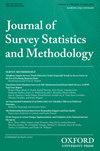Underreporting of Purchases in the US Consumer Expenditure Survey
IF 1.6
4区 数学
Q2 SOCIAL SCIENCES, MATHEMATICAL METHODS
引用次数: 3
Abstract
Motivated misreporting occurs when respondents give incorrect responses to survey questions to shorten the interview; studies have detected this behavior across many modes, topics, and countries. This paper tests whether motivated misreporting affects responses in a large survey of household purchases, the US Consumer Expenditure Interview Survey. The data from this survey inform the calculation of the official measure of inflation, among other uses. Using a parallel web survey and multiple imputation, this article estimates the size of the misreporting effect without experimentally manipulating questions in the survey itself. Results suggest that household purchases are underreported by approximately five percentage points in three sections of the first wave of the survey. The approach used here, involving a web survey built to mimic the expenditure survey, could be applied in other large surveys where budget or logistical constraints prevent experimentation.在美国消费者支出调查中少报购买
当被调查者对调查问题给出不正确的回答以缩短访谈时,会发生动机性误报;研究已经在许多模式、主题和国家中发现了这种行为。本文测试了动机性误报是否会影响家庭购买的大型调查,即美国消费者支出访谈调查的反应。这项调查的数据为官方通货膨胀指标的计算提供了依据,以及其他用途。本文使用平行网络调查和多重输入,在没有实验操纵调查本身问题的情况下估计误报效应的大小。结果显示,在第一波调查的三个部分中,家庭购买被少报了大约5个百分点。这里使用的方法包括模仿支出调查而建立的网络调查,可以应用于预算或后勤限制阻止实验的其他大型调查。
本文章由计算机程序翻译,如有差异,请以英文原文为准。
求助全文
约1分钟内获得全文
求助全文
来源期刊
CiteScore
4.30
自引率
9.50%
发文量
40
期刊介绍:
The Journal of Survey Statistics and Methodology, sponsored by AAPOR and the American Statistical Association, began publishing in 2013. Its objective is to publish cutting edge scholarly articles on statistical and methodological issues for sample surveys, censuses, administrative record systems, and other related data. It aims to be the flagship journal for research on survey statistics and methodology. Topics of interest include survey sample design, statistical inference, nonresponse, measurement error, the effects of modes of data collection, paradata and responsive survey design, combining data from multiple sources, record linkage, disclosure limitation, and other issues in survey statistics and methodology. The journal publishes both theoretical and applied papers, provided the theory is motivated by an important applied problem and the applied papers report on research that contributes generalizable knowledge to the field. Review papers are also welcomed. Papers on a broad range of surveys are encouraged, including (but not limited to) surveys concerning business, economics, marketing research, social science, environment, epidemiology, biostatistics and official statistics. The journal has three sections. The Survey Statistics section presents papers on innovative sampling procedures, imputation, weighting, measures of uncertainty, small area inference, new methods of analysis, and other statistical issues related to surveys. The Survey Methodology section presents papers that focus on methodological research, including methodological experiments, methods of data collection and use of paradata. The Applications section contains papers involving innovative applications of methods and providing practical contributions and guidance, and/or significant new findings.

 求助内容:
求助内容: 应助结果提醒方式:
应助结果提醒方式:


